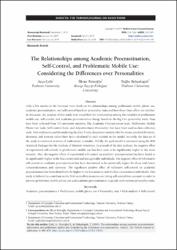| dc.contributor.author | Çebi, Ayça | |
| dc.contributor.author | Reisoğlu, İlknur | |
| dc.contributor.author | Bahçekapılı, Tuğba | |
| dc.date.accessioned | 2020-12-19T20:42:58Z | |
| dc.date.available | 2020-12-19T20:42:58Z | |
| dc.date.issued | 2019 | |
| dc.identifier.citation | Çebi, A., Reisoğlu, İ., Bahçekapılı, T. (2019). Self-control. Addicta: The Turkish Journal on Addictions, 6(3), 449-470. | |
| dc.identifier.issn | 2148-7286 | |
| dc.identifier.issn | 2149-1305 | |
| dc.identifier.uri | https://doi.org/10.15805/addicta.2019.6.3.0082 | |
| dc.identifier.uri | https://app.trdizin.gov.tr/makale/TXpVM09UY3pNdz09 | |
| dc.identifier.uri | https://hdl.handle.net/11436/5806 | |
| dc.description.abstract | Only a few studies in the literature have dwelt on the relationships among problematic mobile phone use, academic procrastination, and self-control based on personality traits and how these three affect one another. In this sense, the purpose of this study is to reveal how the relationships among the variables of problematic mobile use, self-control, and academic procrastination change based on the Big Five personality traits. Data have been collected from 571 university students. The Academic Procrastination Scale, Problematic Mobile Phone Use Scale, Self-Control Scale, and Adjective-Based Personality Test have been used as data collection tools. Path analysis is used for analyzing the data. Firstly, descriptive statistics for the mean, standard deviation, skewness, and kurtosis values have been calculated for each variable in the model. Secondly, the data set of the study is examined in terms of multivariate normality. Thirdly, the path model is estimated using the IBM Statistical Packages for the Analysis of Moment Structures. As a result of the data analysis, the negative effect of experiential self-control on problematic mobile use has been seen to be significantly higher in the more neurotic. Also, the negative effect of experiential self-control on academic procrastination has been found to be significantly higher in the less extraverted and less agreeable individuals. The negative effect of reformative self-control on academic procrastination has been determined to be statistically higher for those with lower conscientiousness and openness. The significant positive effect of redressive self-control on academic procrastination has been identified to be higher in the less neurotic and the less conscientious individuals. This study is believed to contribute to the field as it offers measures on taking self-control into account in order to prevent problematic mobile phone use and academic procrastination in people with various personality traits. | en_US |
| dc.language.iso | eng | en_US |
| dc.rights | info:eu-repo/semantics/openAccess | en_US |
| dc.subject | Academic Procrastination | en_US |
| dc.subject | Problematic Mobile Phone use | en_US |
| dc.subject | Personality Trait | en_US |
| dc.subject | Path Analysis | en_US |
| dc.subject | Self-Control | en_US |
| dc.title | The relationships among academic procrastination, self-control, and problematic mobile use: considering the differences over personalities | en_US |
| dc.type | article | en_US |
| dc.contributor.department | RTEÜ, Eğitim Fakültesi, Bilgisayar ve Öğretim Teknolojileri Eğitimi Bölümü | en_US |
| dc.contributor.institutionauthor | Reisoğlu, İlknur | |
| dc.identifier.doi | 10.15805/addicta.2019.6.3.0082 | |
| dc.identifier.volume | 6 | en_US |
| dc.identifier.issue | 3 | en_US |
| dc.identifier.startpage | 449 | en_US |
| dc.identifier.endpage | 470 | en_US |
| dc.ri.edit | oa | en_US |
| dc.relation.journal | Addicta: The Turkish Journal on Addictions | en_US |
| dc.relation.publicationcategory | Makale - Uluslararası Hakemli Dergi - Kurum Öğretim Elemanı | en_US |


















